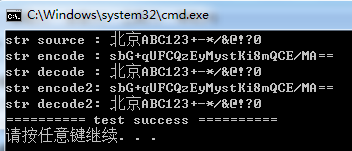版权声明:本文为博主原创文章,未经博主允许不得转载。 https://blog.csdn.net/fengbingchun/article/details/85218653
网上有一些开源的base64编解码库的实现,下面介绍几个:
cppcodec是一个仅包括头文件的C++11库,用于编解码RFC 4648中指定的base64, base64url, base32, base32hex等,它的License为MIT,源码在https://github.com/tplgy/cppcodec ,最新发布版本为v0.2,在windows下需要vs2015及以上才可以正常编译。
b64.c是一个C语言实现的base64编解码库,它的License为MIT,源码在https://github.com/littlstar/b64.c。
在https://stackoverflow.com/questions/342409/how-do-i-base64-encode-decode-in-c中给出了一个实现,并给出了一些base64开源库的性能测试结果。
关于base64的介绍可以参考:https://blog.csdn.net/fengbingchun/article/details/85016088
以下是两种base64开源库(b64.c和stackoverflow中给出的)实现的测试代码:
#include "funset.hpp"
#include <stdio.h>
#include <stdlib.h>
#include <stdint.h>
#include <string>
#include <b64/b64.h>
namespace {
// reference: https://stackoverflow.com/questions/342409/how-do-i-base64-encode-decode-in-c
static char encoding_table[] = {'A', 'B', 'C', 'D', 'E', 'F', 'G', 'H',
'I', 'J', 'K', 'L', 'M', 'N', 'O', 'P',
'Q', 'R', 'S', 'T', 'U', 'V', 'W', 'X',
'Y', 'Z', 'a', 'b', 'c', 'd', 'e', 'f',
'g', 'h', 'i', 'j', 'k', 'l', 'm', 'n',
'o', 'p', 'q', 'r', 's', 't', 'u', 'v',
'w', 'x', 'y', 'z', '0', '1', '2', '3',
'4', '5', '6', '7', '8', '9', '+', '/' };
static char *decoding_table = NULL;
static int mod_table[] = { 0, 2, 1 };
void build_decoding_table()
{
decoding_table = (char*)malloc(256);
for (int i = 0; i < 64; i++)
decoding_table[(unsigned char)encoding_table[i]] = i;
}
char* base64_encode(const unsigned char *data, size_t input_length, size_t *output_length)
{
*output_length = 4 * ((input_length + 2) / 3);
char *encoded_data = (char*)malloc(*output_length);
if (encoded_data == NULL) return NULL;
for (int i = 0, j = 0; i < input_length;) {
uint32_t octet_a = i < input_length ? (unsigned char)data[i++] : 0;
uint32_t octet_b = i < input_length ? (unsigned char)data[i++] : 0;
uint32_t octet_c = i < input_length ? (unsigned char)data[i++] : 0;
uint32_t triple = (octet_a << 0x10) + (octet_b << 0x08) + octet_c;
encoded_data[j++] = encoding_table[(triple >> 3 * 6) & 0x3F];
encoded_data[j++] = encoding_table[(triple >> 2 * 6) & 0x3F];
encoded_data[j++] = encoding_table[(triple >> 1 * 6) & 0x3F];
encoded_data[j++] = encoding_table[(triple >> 0 * 6) & 0x3F];
}
for (int i = 0; i < mod_table[input_length % 3]; i++)
encoded_data[*output_length - 1 - i] = '=';
return encoded_data;
}
unsigned char* base64_decode(const char *data, size_t input_length, size_t *output_length)
{
if (decoding_table == NULL) build_decoding_table();
if (input_length % 4 != 0) return NULL;
*output_length = input_length / 4 * 3;
if (data[input_length - 1] == '=') (*output_length)--;
if (data[input_length - 2] == '=') (*output_length)--;
unsigned char *decoded_data = (unsigned char*)malloc(*output_length);
if (decoded_data == NULL) return NULL;
for (int i = 0, j = 0; i < input_length;) {
uint32_t sextet_a = data[i] == '=' ? 0 & i++ : decoding_table[data[i++]];
uint32_t sextet_b = data[i] == '=' ? 0 & i++ : decoding_table[data[i++]];
uint32_t sextet_c = data[i] == '=' ? 0 & i++ : decoding_table[data[i++]];
uint32_t sextet_d = data[i] == '=' ? 0 & i++ : decoding_table[data[i++]];
uint32_t triple = (sextet_a << 3 * 6)
+ (sextet_b << 2 * 6)
+ (sextet_c << 1 * 6)
+ (sextet_d << 0 * 6);
if (j < *output_length) decoded_data[j++] = (triple >> 2 * 8) & 0xFF;
if (j < *output_length) decoded_data[j++] = (triple >> 1 * 8) & 0xFF;
if (j < *output_length) decoded_data[j++] = (triple >> 0 * 8) & 0xFF;
}
return decoded_data;
}
void base64_cleanup()
{
free(decoding_table);
}
} // namespace
int test_b64_base64()
{
std::string str = "北京ABC123+-*/&@!?0";
fprintf(stdout, "str source : %s\n", str.c_str());
char* str_en = b64_encode((const unsigned char*)str.c_str(), str.length());
fprintf(stdout, "str encode : %s\n", str_en);
std::string tmp(str_en);
//fprintf(stdout, "str_en length: %d\n", tmp.length());
unsigned char* str_de = b64_decode(tmp.c_str(), tmp.length());
fprintf(stdout, "str decode : %s\n", str_de);
free(str_en);
free(str_de);
size_t output_length_encode = 0;
char* str_en2 = base64_encode((const unsigned char*)str.c_str(), str.length(), &output_length_encode);
std::string tmp2(str_en2, output_length_encode);
fprintf(stdout, "str encode2: %s\n", tmp2.c_str());
size_t output_length_decode = 0;
//fprintf(stdout, "output_length_encode: %d, str_en2 length: %d\n", output_length_encode, tmp2.length());
unsigned char* str_de2 = base64_decode(str_en2, output_length_encode, &output_length_decode);
std::string tmp3((char*)str_de2, output_length_decode);
fprintf(stdout, "str decode2: %s\n", tmp3.c_str());
free(str_en2);
free(str_de2);
base64_cleanup();
return 0;
}
执行结果如下:可见两种实现的base64编解码结果一致。
